- Home
- Andrew McGahan
1988 Page 7
1988 Read online
Page 7
‘He wants to see us this afternoon,’ he said, ‘Three o’clock.’
‘What’s his name?’
‘Terry Gallagher.’
‘And what is he exactly?’
‘Some boss in the Conservation Commission. They look after all the national parks up here, and the weather station’s in a national park. He said he thought we were getting here a week ago.’
‘You said it was this week.’
‘That’s what I thought.’
‘Did you know?’
‘What does it matter?’
‘Jesus, Wayne.’
It was a promising start.
For lunch we wandered into the centre of town. There was a mall. Just off that we found a Kentucky Fried. I indulged. Wayne watched me eat. He was in a McDonald’s mood. We asked the Kentucky Fried girl where we might find one. She said that Darwin had no McDonald’s. Wayne and I looked at each other. There was nothing to say. Wayne ordered nuggets.
We walked around some more. It was a frontier town alright. Tourists were everywhere. The mall thronged with tanned young bodies, money-belts around their waists. There were European accents, Asian accents. Travel agents offering tours of Kakadu and the Kimberly. Cut-price air fares to Bali. And this was in the off-season.
We went down to the beach. There was no surf. Nor was there anyone swimming. Warning signs mentioned marine stingers, sharks, and crocodiles. It was hard to take the crocodile threat all that seriously, even if the Territory was famous for them. In a swamp, in a creek, certainly—but a city beach? Perhaps that was why tourists like us died so often. It didn’t matter. We weren’t there to look at the beach. It was the ocean we wanted.
We looked out across it, north and west. There were huge white rain clouds piled on the horizon. I’d forgotten exactly which body of water it was. Perhaps the Timor Sea. Or the Arafura. Either way we weren’t looking east and it wasn’t the Pacific, and that was the important thing. We’d travelled somewhere. There was a feel about Darwin. In the air. It was a weight, a heat and humidity that was nothing like Brisbane. Coming down from Asia. The breath of the monsoon.
On the other hand it wasn’t southern Chile, or the remotest Russian Tiaga, or the upper reaches of the Zaire River. Australia was only so big, and we were still in it. We got sick of looking at the ocean and the clouds. We went back to the hostel. At two-thirty we drove out to the offices of the Northern Territory Conservation Commission, to see about our jobs.
Wayne’s connection, Terry Gallagher, turned out to be the Managing Director of the entire Commission. We were ushered into his office at about three-thirty, after sitting in the waiting room, staring at framed photographs of Territory scenery. Terry was a big, solid, balding man. He was dressed in shorts, shirt, long socks and a tie. He was drinking a can of Victoria Bitter beer. ‘Sorry,’ he said, indicating the beer, ‘I was just having a coffee break.’
I took that as a positive sign. We sat down, he sat down. ‘So you finally made it,’ he said to Wayne.
Wayne nodded, didn’t speak. He was looking uncomfortable. His hand was on his chin, fingers playing with his lip.
‘How’s your father?’
‘Alright.’
‘Yeah, he sounded fine when we cooked this thing up. Like I said though, you were supposed to be here a week ago.’
‘I didn’t realise.’
‘Mmm.’ He looked at me. ‘And who are you exactly?’
‘Gordon Buchanan. Wayne said he needed someone to work with him. At the weather station.’
‘Oh. It’s only a one-man job though, you know that don’t you?’
‘No.’ I looked at Wayne. ‘At least I didn’t.’
Wayne looked back. ‘Well, neither did I.’
We sat there. Terry sipped on his beer.
‘Of course,’ he said, ‘The two of you can go out there if you want. Split the work. It’s supposed to be a bitch to do alone anyway. But there’s only the one pay cheque.’
I looked at Wayne again. He showed no signs of adding anything. I said, ‘How much money is it?’
‘You’d have to ask the Bureau of Meteorology. They pay you. We just send you over. It’s a bit of a grey area, just who’s in charge of the whole thing. It’s their weather station, you see, but it’s in our park.’ He got up and called someone from an outer office. A young man came in, wearing a brown ranger uniform.
Terry pointed to Wayne and I. ‘Tom, these are the guys going across to Cape Don. Can we organise them a flight?’
‘Sure. When?’
Terry meditated a moment. Then he picked up the phone and dialled. He talked for a while, wrote some things down, then hung up. He turned to Wayne. ‘That was the Met. Bureau. They want to see you tomorrow. Give you the training for the weather station. So I suppose you can go the day after.’
Wayne nodded. Sat. Said nothing.
I gave up on him. I said, ‘Ah . . . where exactly are we going?’
‘Hasn’t anyone told you?’
‘Only that it’s a lighthouse somewhere.’
‘Jesus. Well, you’re going to Cape Don. It’s a few hundred ks northeast of here, on the tip of the Cobourg Peninsula.’ He turned to a map that hung on the wall behind him. It showed the Northern Territory. He pointed to a small knob of land on the very tip of the state. ‘There. The lighthouse marks the channel between the mainland and Melville Island.’
‘And what else is there, exactly?’
‘Not much. There’s no road to it or anything, but there’s an airstrip nearby. The lighthouse is there of course. And the weather station. A few old houses that used to belong to the lighthouse keepers, one of which’ll be yours. We have a couple of rangers stationed there. Some boats. A two-way radio—there’s no phone. That’s about it.’
He paused. Sighed.
‘To tell the truth the whole thing’s fucked up. The Met. Bureau’s pissed off because they have no say in who gets sent over there, and so are the traditional owners. I don’t suppose you know. The park is called the Gurig National Park. It takes up the whole Cobourg Peninsula. We manage it in partnership with the Aboriginal owners. Half of it, with their permission, is open to very limited tourism. The other half, the half where you’re going, isn’t. They don’t mind us having a ranger or two there, but they’re not so keen on you weather observers.’
Wayne laughed. ‘They haven’t even met us yet.’
‘What I mean,’ Terry said evenly, ‘is that they’ve been making noises about getting their own people to run the weather station. So they’re not too pleased that we gave it to you without asking them first. But that was a favour to your father. I don’t suppose you’ve ever worked with Aborigines?’
Wayne shook his head. I shook mine.
‘Well, it’s too late now. Tom, get the flight organised for Wednesday. Is there anything else we have to tell them?’
Tom said, ‘You’ll have to open an account at the Nightcliff supermarket. We have a deal there. Supplies get flown out to Cape Don once a week, on Fridays. You radio your weekly order to the supermarket, then they pack it up and get it to the plane. Take shitloads of insect repellent. The settlement is right up by the mangroves, and the sandflies will eat you alive. Have you got a cheque account, or credit cards?’
Again, we shook our heads.
‘Better sort something out then. The supermarket usually wants monthly payments, and you can hardly get cash out there.’ He smiled at us, a little pitying. ‘And most important of all, don’t forget to take alarm clocks.’
‘Alarm clocks?’
‘You’ll see. And take wind-up ones, not electric. There’s power out there, but the generators aren’t the most reliable. That’s about all I can think of.’
‘Thanks Tom,’ said Terry, ‘Get on to that flight.’
‘Sure.’ He asked our names, we told him, and he was gone. There was a pause. Terry finished off his beer.
‘You an artist too?’ he asked me.
‘No.’ Another pause. ‘I’m
a writer.’
‘I see. A writer. Novels?’
‘I’m trying.’
‘Uh-huh.’ He was through with me. ‘Wayne, we thought we might get you to paint some portraits while you’re over there.’
Wayne sat up. ‘I don’t do many portraits.’
‘Really? Your father says you do excellent portraits. We thought we might get a series from you. Some of the traditional owners. The elders. Allan Price for one—he’s the tribal spokesman and chairman of the park board. A few others. We’d pay you of course.’
‘Well . . . I’ll think about it.’
‘Have a look out there. It’s beautiful country. I’ll get a message to you after you’ve had a couple of weeks to settle in. You’ve won an award for portrait painting, I hear from your father.’
‘I didn’t exactly win.’
‘Of roadworkers, wasn’t it? Commissioned by the Queensland Department of Transport?’
‘No, they held a competition. They’re having some sort of Bicentennial exhibition, at Expo. They picked four on a shortlist. I’m one of them.’
‘Well, as I say, see how you go. But there’re plenty of things to paint on Cobourg.’
‘Uh . . . I don’t do many landscapes either.’
Terry nodded vaguely. We waited. Tom came back. ‘Wednesday,’ he said, ‘Two o’clock. Be at the Northwing office at the airport. I also rang the Nightcliff supermarket and told them to expect you.’
‘That’s that then,’ said Terry, standing up. We stood up too. He handed us the paper he’d written on. ‘Remember, be at the Met. Bureau tomorrow morning. Ten o’clock. That’s the address. And don’t fuck around over at Cape Don either. Things are touchy enough without you two making it worse.’
‘We won’t,’ said Wayne.
And we were back in the waiting room.
We headed for the hostel.
‘You didn’t tell me you were on a shortlist,’ I said.
‘I don’t even like doing portraits. I just did it to keep Mum pacified.’
We drove in silence.
Finally I said, ‘So who opens a cheque account for the supermarket? You or me?’
‘What do you need to open a cheque account?’
‘I don’t know. Some ID, I suppose.’
‘I don’t have any.’
‘Okay. It’s me then.’
Wayne lit a cigarette. Dangled a hand out the window. I watched him. I was angry. I said, ‘Did you really not know it was only a one-man job?’
‘No one ever said exactly. But I wasn’t gonna come up here alone. Why, don’t you want it now?’
‘I don’t really have any choice, do I.’
‘I suppose not.’
‘You could’ve at least done some of the talking in there. Terry is your father’s friend, not mine.’
He blew out the smoke. ‘I thought I’d leave the questions to you. I’m never any good at that sort of thing. You are though.’
I looked at him.
It wasn’t a compliment.
I caught the bank just before closing, and got the cheque account organised. I didn’t even know from where or when the money would arrive to fill it. Or how much it would be. Only half of the cash would be mine anyway. A one-man job, a one-man wage.
The bank told me to come back on Wednesday morning for the chequebook. I walked out into the heavy Darwin afternoon. That was enough official organisation for the day. It was time for a drink. I went back to the hostel. In the lobby I found a copy of the Northern Territory Times. I took it up to the room. There were only two nights of civilisation left to us.
We went through the entertainment pages. Two pubs showed signs of life. One of them, out in the suburbs, had ‘Bikini Girl Jelly Wrestling’. The other, in the city centre, had ‘The Joe Francis Band, Live From Sydney.’ For a Monday evening, it was about as good as anything Brisbane might offer. Which wasn’t bad, seeing Darwin was about one-twentieth the size. We chose the Joe Francis Band, simply because it was within walking distance, and went back out to the streets.
We found the pub, the Victoria Hotel, in the town mall. We went upstairs. It was early yet, and the place was mostly empty. We ordered our beers, sat at a table. Band equipment was set up on a low stage, down one end. There was a chicken-wire barrier stretched across in front of the stage. I thought about the barrier and what it meant and what I wanted. It seemed we’d come to the right place.
TEN
Despite the hangovers, we made our ten o’clock appointment with the Bureau of Meteorology. The Bureau’s administration building was in the city centre, but we’d been told to go to their weather station out at the airport, for practical training. A security officer directed us to a long, low shack not far from one of the runways. We parked, went inside, and gave our names.
A young man came out to meet us. He had a thin, pale face and long black hair. He was eating a carrot sandwich. Brown bread, the carrot grated.
‘You’re the Cape Don boys.’
‘That’s right,’ I said. Somehow it had been decided, I would be the speaker for the two of us. It wasn’t a question of dominant personalities. Dealing with these sorts of authorities was a responsibility neither of us really wanted. Wayne obviously wanted it least. So it had fallen to me.
‘Ever done any weather work before?’ the man asked.
‘No.’
He shook his head. ‘Well, at least this time they gave us a whole day to train you. Usually it’s just a couple of hours.’
He finished up his sandwich and shook our hands, told us his name was Lawrence. He wasn’t happy with the situation, but he didn’t seem to hold it against us personally. First he gave us a tour of the building. None of it meant much to me. There were rooms of radar screens, charting rooms, computer terminals, all the things you might’ve expected in a weather centre. Lawrence didn’t bother explaining how it all worked.
‘You won’t be using anything like this at Cape Don,’ he said. He took us to the lunch room, sat us down, and explained. ‘Out there you’ll have only certain instruments. Your job will be to read those instruments once every three hours, make various calculations, and encode the results in a field-book. You also have to radio the information back to us here in Darwin. Each reading and reporting session is called an observation. It should take about ten minutes, once you’re used to it. Your reading times are 9 a.m., midday, 3 p.m., 6 p.m., 9 p.m., 3 a.m, and 6 a.m.. We let you have midnight off.’
Wayne looked pained. ‘We do weather that early in the morning? What if we sleep in?’
‘Don’t. You can’t miss observations. We rely on regular information from our weather stations. Besides, you only get paid per observation. So if you skip one you skip the money for it too.’
I said, ‘What does the money come to, per week?’
‘If you get every observation, about four hundred and fifty.’
Four hundred and fifty. Divided by two, and taking away tax, I was worse off than I’d been at the bottle shop. Financially it was a disaster then. On the other hand, it sounded like only an hour or two’s work each day. Nor would we pay any rent. Keeping that in mind, the money didn’t seem so bad. I wouldn’t starve on it, and I wouldn’t run out of alcohol. And anyway, writing was supposed to be the whole point here, not wage-earning.
Lawrence found a blank field-book and showed it to us. It was a wide-leafed journal, the pages divided into columns and boxes. He gathered up a few pens and manuals. Then he led us outside to show us the routine.
First, we went to a small box on a short pole about twenty metres from the shack. ‘This,’ said Lawrence, ‘Is the thermometer screen.’
He opened the ventilated door. There were four large thermometers inside. Two upright, two on their sides. One of the upright thermometers had its bottom wrapped in cloth, and the cloth was dipped in water. It was, Lawrence explained, the Wet Bulb Thermometer. The other was the Dry Bulb Thermometer. By comparing the readings of the two, humidity could be calculated. The two thermo
meters on their sides were the Minimum and Maximum Thermometers. They recorded minimum and maximum temperatures. The Wet and Dry were read every three hours, the Minimum and Maximum only twice a day. We read them all, and recorded the information in the appropriate place in the field-book.
Next to the box was a rain gauge. That was straightforward. We opened it, looked in, saw that there had been no rain in the last three hours, wrote so in the field-book. If it had been raining, then we were supposed to record what type of rain it had been. Showers. Storms. Sleet. Heavy or light. Lawrence opened one of the manuals, showed us a long list of official precipitation types from which to choose.
From there we went back to the shack. Inside there was a large, highly accurate barometer. Lawrence taught us how to read it, and how to calculate the real air pressure by taking into account temperature and height above sea level. Then he showed us a barograph. It recorded the rise and fall of barometric pressure over a weekly period. The paper had to be replaced every seven days, and the used sheet stuck in the back of the field-book.
From there it was over to the read-out for the wind meter. Pressing one button gave you the current wind strength. Pressing another gave you the maximum wind gust over a specified number of hours, a third gave you the average wind strength over the same period. It also told wind direction.
‘So what was the story with Cyclone Tracy?’ I asked, ‘What was the maximum gust?’
‘217 ks. That wasn’t the maximum though, that was just when the meter blew away.’
We went back outside again.
‘Now this is the only tricky part,’ he said, looking up. ‘The clouds.’
We looked up. There were clouds up there alright. Big fluffy ones coming in from the ocean. I remembered from my school days that the big fluffy ones were called cumulonimbus.
‘There’re four things you have to tell us about the clouds,’ Lawrence went on, ‘How high they are. What type they are. How much of the sky they cover. And which way they’re going.’

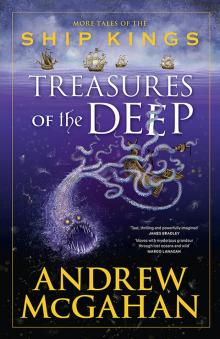 Treasures of the Deep
Treasures of the Deep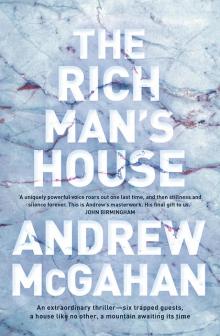 The Rich Man’s House
The Rich Man’s House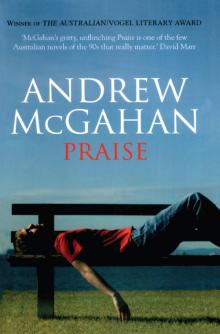 Praise
Praise The White Earth
The White Earth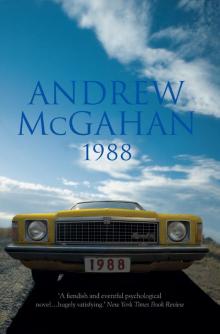 1988
1988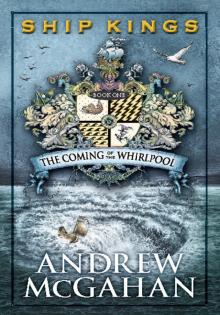 The Coming of the Whirlpool
The Coming of the Whirlpool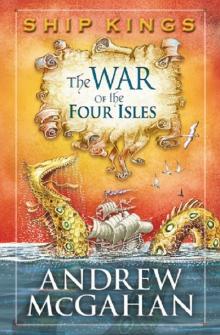 The War of the Four Isles
The War of the Four Isles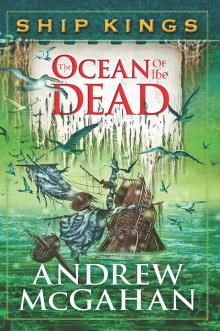 The Ocean of the Dead: Ship Kings 4
The Ocean of the Dead: Ship Kings 4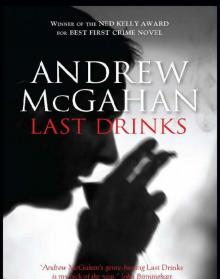 Last Drinks
Last Drinks Wonders of a Godless World
Wonders of a Godless World Underground
Underground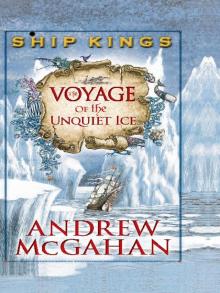 The Voyage of the Unquiet Ice
The Voyage of the Unquiet Ice